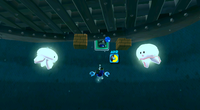Jammyfish
| Jammyfish | |||
|---|---|---|---|
 Artwork of a Jammyfish from Super Mario Galaxy 2. | |||
| First appearance | Super Mario Galaxy (2007) | ||
| Latest appearance | Super Mario 3D All-Stars (2020) | ||
| |||
| |||

Jammyfish[1] (originally referred to as "jellyfish" in a general sense by Prima Games[2]) are underwater jellyfish enemies in the Super Mario Galaxy games. In the first Super Mario Galaxy, they are found in underground lakes in Bigmouth Galaxy and Deep Dark Galaxy. Schools made up of four Jammyfish swim in vertical rings. Isolated Jammyfish passively suspend themselves in water and pulsate their bodies. Direct contact will deplete one bar from Mario's Life Meter. In Super Mario Galaxy 2, they appear in Cosmic Cove Galaxy. They do not form schools in this game, but individual Jammyfish behave similarly by swimming in rings, or back-and-forth. They can be defeated with either a spin or a Koopa Shell and give a coin when defeated. They do not actively pursue Mario. Giant versions called Jam-o'-Wars also appear in these games that require two strikes to defeat.
Gallery
Model from Super Mario Galaxy
Additional names
Internal names
| Game | File | Name | Meaning
|
|---|---|---|---|
| Super Mario Galaxy Super Mario Galaxy 2 |
ObjectData/Jellyfish.arc | Jellyfish | - |
| Super Mario Galaxy Super Mario Galaxy 2 |
StageData/ObjNameTable.arc/ObjNameTable.tbl SystemData/ObjNameTable.arc/ObjNameTable.tbl |
クラゲ (Kurage) | Jellyfish |
Names in other languages
| Language | Name | Meaning |
|---|---|---|
| Japanese | ユラリ[3] Yurari |
A Japanese term meaning "swinging repeatedly" |
| German | Qualle |
Jellyfish |
| Italian | Medusilla |
L'il Jellyfish |
| Spanish (NOE) | Aguamala |
- |
